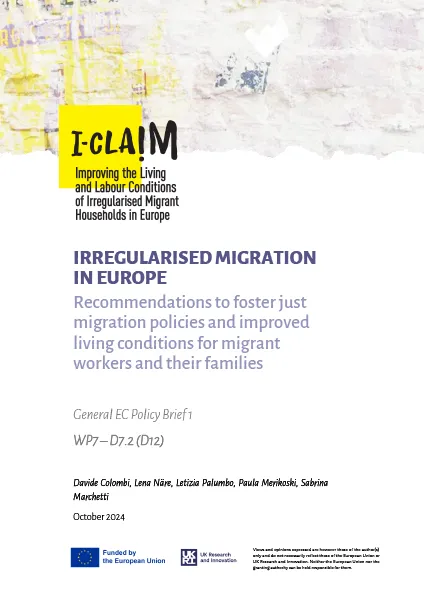Irregularised Migration in Europe
Davide Colombi, Lena Näre, Letizia Palumbo, Paula Merikoski, Sabrina Marchetti
How to cite:
Colombi, D. Näre, L., Palumbo, L., Merikoski, P., & Marchetti, S. (2024). Irregularised migration in Europe. Policy Brief. I-CLAIM.
Irregularised Migration in Europe
Davide Colombi, Lena Näre, Letizia Palumbo, Paula Merikoski, Sabrina Marchetti
This Policy Brief is based on the I-CLAIM Comparative Report on ‘the Legal and Policy Infrastructure of Irregularity’ (Näre et al., 2024). This Report brings together the cross-cutting findings of the research conducted at the national level in Finland, Germany, Italy, the Netherlands, Poland, and the United Kingdom and at the EU level.
I-CLAIM research has shown that irregular status results from the interaction of migration, welfare, labour, and social policies at various levels of governance. Increasingly restrictive border, asylum and visa policies force people into irregular status, with severe consequences for their rights and well-being. These stringent national policies overlook local realities, requiring municipalities to step in and offer inclusive social and welfare services, often facing constraints imposed by restrictive national laws.
National experiences of regularisation programmes vary significantly. These programmes are often overly selective and restrictive, leading to long-term insecurity. Irregularised people in the labour market are exposed to exploitation and precarious conditions. They are often forced to resort to undeclared work, where they are vulnerable to exploitation and discrimination, with limited rights and access to justice.
Building on this evidence, the Policy Brief recommends (i) prioritising the establishment of regular pathways and regularisation programmes or mechanisms, as well as effectively applying existing legal instruments and filling in the gaps in current bureaucratic procedures and processes; (ii) strengthening European-national-local level coordination and bottom-up policymaking to respond to the needs of local communities; and (iii) combating exploitative and discriminatory working conditions for all migrant workers irrespective of their immigration status, ensuring access to justice for irregularised workers in the labour market and addressing institutionalised racism and discrimination.
